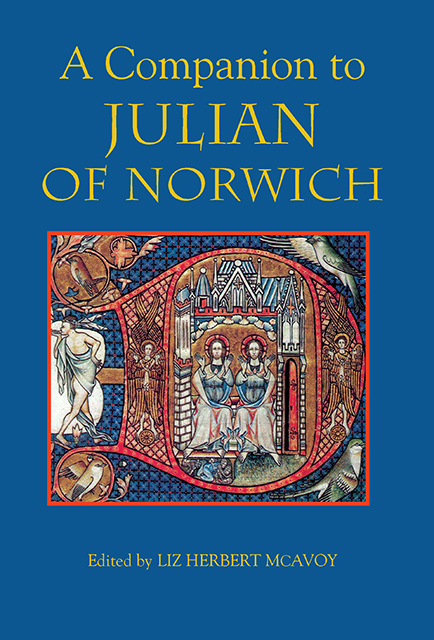13 - ‘For we be Doubel of God's Making’: Writing, Gender and the Body in Julian of Norwich
Published online by Cambridge University Press: 10 March 2023
Summary
In her critique of traditional psychoanalytical discourse pertaining to the threatening body of the mother, Luce Irigaray calls for a non-phallic language which, rather than seeking to control this perceived ‘threat’, will embrace the ‘love, desire, language, art, the social, the political, the religious’ which she claims the mother brings to the world and which is denied her under patriarchy. For Irigaray, in order for ‘woman’ to (re)discover her place within her own subjectivity and language, she has to cross the chasm back to the place of the mother and reject traditional oedipal configurations which sever her from that primary bond:
We have to discover a language which does not replace the bodily encounter, as paternal language attempts to do, but which can go along with it, words which do not bar the corporeal, but which speak corporeal.
The oedipal equation which, within Freudian analysis, renders sexual difference primary within human culture, functions, according to Amy Hollywood’s appraisal, ‘to naturalize the multiple forms of power and oppression on which white, propertied, Christian, European men grounded their supremacy’. In other words, the Freudian configuration of the mother leads to a fetishized, suffering and desubjectivized female body which is dependent upon traditional political and institutional authority for its meaning. I argue that it is just such an alienated and desubjectivized body which Julian herself is in possession of at the moment of her first visionary encounter with the divine ‘Other’, experienced during her thirty-first year as a woman in 1373. It is also this alienated body which provides the starting point for her attempts to articulate in writing both that encounter and the body which receives it, whether for her own ruminative and exegetical purposes, or with a specific readership in mind. As I shall demonstrate, the bodily nature of Julian's encounter with the divine Other compels her over the course of the next forty or so years of her life to develop a powerfully persuasive hermeneutic of the female body which will draw increasingly upon the same semiotics, or sign system, of primary unity (with the mother) as postulated by Julia Kristeva in more recent times.
This is, however, a reading of Julian's hermeneutics which some contemporary commentators have been at pains to reject, in spite of Julian's foregrounding of female and feminine bodies in her writing and the famously innovative representation of God as the universal Mother of humanity.
- Type
- Chapter
- Information
- A Companion to Julian of Norwich , pp. 166 - 180Publisher: Boydell & BrewerPrint publication year: 2008

